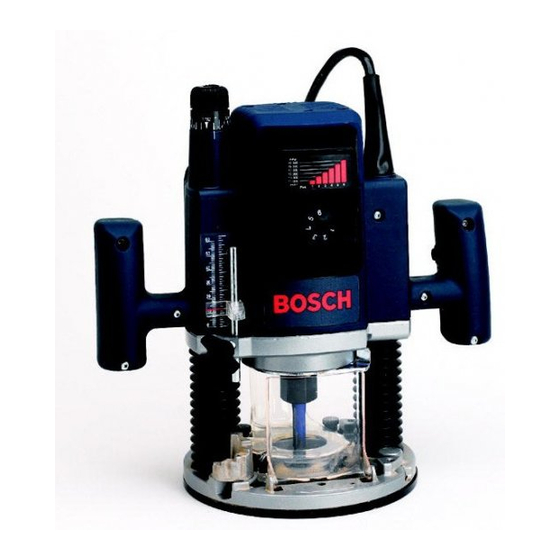Bosch 1614 사용 설명서 - 페이지 7
{카테고리_이름} Bosch 1614에 대한 사용 설명서을 온라인으로 검색하거나 PDF를 다운로드하세요. Bosch 1614 28 페이지. Plunge router
Bosch 1614에 대해서도 마찬가지입니다: 사용 설명서 (28 페이지)

out until the cutters are approximately 1/8" to
1/4" away from the collet chuck face. With the
router bit inserted and the spindle lock fully
engaged, tighten the collet chuck assembly
firmly in a clockwise direction, (viewed from
under the router), with the wrench supplied. To
avoid damaging the collet chuck, never tighten
the collet chuck unless a router bit of proper
shank size is inserted into the collet.
To ensure proper gripping of the router bit and
minimize run-out, the shank of the router bit
should always be inserted at least 5/8".
CAUTION!
To prevent damage to tool. Do
not tighten collet without a bit. NOTE: The bit
shank and chuck should be clean and free of
dust, wood, residue and grease before assem-
bling.
CAUTION!
Do not use router bits greater
than 1-5/8" in diameter as they will not fit
through the base casting.
Removing the Router Bit
Use the spindle lock and wrench as described
above, and turn the collet chuck assembly in a
counter-clockwise direction. Once the collet
chuck assembly is loosened, continue to turn
the collet chuck until it pulls the collet free
from its taper, and the router bit can be re-
moved.
NOTE: The collet chuck is self-extracting; it is
NOT necessary to strike the collet chuck to free
the bit.
Collet Chuck Care
With the router bit removed, continue to turn
the collet chuck counter-clockwise until it is
free of the shaft. To assure a firm grip, occa-
sionally blow out the collet chuck with com-
pressed air, and clean the taper in the armature
assembly shaft with a tissue or fine brush. The
collet chuck is made up of three component
parts as illustrated;
check to see that the re-
taining ring 21 is prop-
erly located around the
collet 22 and seated in
the inner groove of the
collet chuck nut 23 and
BM 2610967928 1/97
lightly thread the collet chuck back onto the
armature shaft. Replace worn or damaged
collet chucks immediately.
To release the plunge mechanism, grasp the
router handles firmly with both hands and press
the plunge lock/release lever 16 with the thumb
of the left hand. The motor may then be raised
or lowered to the desired position. The plunge
lock/release lever is spring-loaded, and will
hold the router motor in position when pressure
on the lock lever is released. When plunging,
always apply uniform firm pressure to both
handles to avoid cocking the motor on the
posts.
The depth indicator rod 3 and the revolving
depth turret 7 are used to control cutting depth
as follows;
With the bit installed, gently lower the motor
until the tip of the router bit just contacts the
level surface the router is sitting on. This is the
"zero" position, from which further depth ad-
justments can be accurately made. To set a
desired depth of cut, rotate revolving depth
turret until the lowest step is aligned with the
depth indicator rod. Loosen depth indicator
lock/release knob 5 and lower the depth indica-
tor rod until it contacts the lowest step of the
turret. Slide the depth indicator 4 until the red
line indicates zero on the depth scale, indicating
the point at which the bit just contacts the work.
To set a desired cutting depth, slide the depth
indicator rod up until the red depth indicator
line attains the desired cutting depth, and se-
cure the rod in position by firmly tightening the
depth indicator lock/release knob. The desired
depth of cut may now be achieved by plunging
the router until the depth indicator rod contacts
the selected stop on the revolving depth turret.
To be certain that your depth settings are accu-
rate, you may want to make test cuts in scrap
21
material before beginning work. Once the de-
sired final depth has been set on the lowest
22
depth turret setting with the depth indicator
25
rod, it is possible to make progressively deeper
23
cuts by starting with a higher flat on the depth
turret and after each cut, rotating the revolving
7
7
Plunge Mechanism
Indicator Rod and Turret
12/7/98, 10:29 AM
